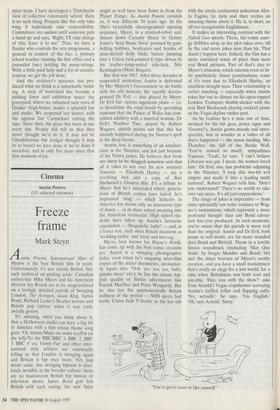Cinema
Austin Powers
(15, selected cinemas)
Freeze frame
Mark Steyn
Austin Powers, International Man of Mystery is the best British film in years. Unfortunately, it's not exactly British, but, such technical nit-picking aside, Canadian author/star Mike Myers and his American director Jay Roach are to be congratulated on a lovingly detailed parody of Swinging London, The Avengers, Jason King, James Bond, Richard Lester's Beatles movies and British pop culture when it was truly, awfully groovy.
It's amazing, when you think about it, that a Hollywood studio can have a big hit in America with a film whose theme song goes: '0i, missus/Make me some tea/Put on the telly/To the BBC/BBC 1, BBC 2, BBC 3, BBC 4' etc. Vanity Fair and other inter- national style arbiters are continually telling us that London is swinging again and Britain is hip once more. Yet, pop music aside, this swinging hipness is abso- lutely invisible in the broader culture: there are no mainstream British hip movies or television shows; James Bond gets less British with each outing; the new Saint might as well have been flown in from the Planet Zongo. As Austin Powers reminds us, it was different 30 years ago. In the film's beautifully choreographed opening sequence, Myers, in a crushed-velvet suit, dances down Carnaby Street to Quincy Jones's 'Soul Bossa Nova' pursued by gam- bolling bobbies, beefeaters and hordes of mini-skirted dolly birds, before jumping into a Union Jack-painted E-type driven by his leather-jump-suited side-kick, Mrs Kensington (Mimi Rogers).
But that was 1967. After three decades in suspended animation, Austin is defrosted by Her Majesty's Government to do battle with his old nemesis, the equally decryo- genised Dr Evil — also played by Myers. Dr Evil has various ingenious plans — i.e. to destabilise the royal family by spreading rumours that the Prince of Wales has com- mitted adultery with a married woman. Dr Evil's Number Two, played by Robert Wagner, quietly points out that this has already happened during the Doctor's spell in the deep-freeze.
Austin, too, is something of an anachro- nism in the Nineties, and not just because of his Nehru jacket. He believes that birds are there to be shagged senseless and that all it takes to win over his new assistant Vanessa — Elizabeth Hurley — are a revolving bed and a copy of Burt Bacharach's Greatest Hits. It's a tribute to Myers that he's succeeded where genera- tions of British comics have failed: he's implanted 'shag' — which hitherto in America has meant only an innocuous type of dance — in its more robust meaning into the American vernacular. High school stu- dents have taken up Austin's favourite ejaculation — `Shagadelic, baby!' — and, in a lesser way, such other British locutions as `wedding tackle' and 'meat and two veg'. Myers, best known for Wayne's World, has come up with his best comic creation yet. Austin is a swinging photographer (who, even when he's snapping microfilm copies of the secret documents, involuntar- ily lapses into, 'Ooh, yes, yes, yes, baby, gimme more' etc.); he has the ornate fop- pish quality of Sixties adventurers like Patrick MacNee and Peter Wyngarde. But he also has the quintessentially British naffness of the period — NHS specs, bad teeth, Union Jack Y-fronts; in the hot tub with the exotic continental seductress Alot- ta Fagina, he farts and then recites an amusing rhyme about it. He is, in short, an all too recognisable Englishman.
It makes an interesting contrast with the Naked Gun spoofs. There, the comic ener- gy dribbles away as the plot takes over, till by the end more jokes miss than hit. That doesn't happen here. Indeed, the film has a more sustained sense of place than most real Bond pictures. Part of that's due to Myers's abandon, which extends even to lit- tle psychedelic dance punctuations; some of it's even due to Elizabeth Hurley, an excellent straight man. Their relationship is rather touching — especially when Austin takes her out to dinner on his open-topped London Transport double-decker with the real Burt Bacharach playing cocktail piano as the Vegas skyline rushes past.
As he realises he's a man out of time, mocked for his fab gear, peace signs and `Groovyrs, Austin grows moody and intro- spective, lost in wonder at a video of all that's happened — the moon landing, Mrs Thatcher, the fall of the Berlin Wall. `You've missed so much', sympathises Vanessa. 'Yeah', he says. 'I can't believe Liberate was gay. I mean, the women loved him.' Dr Evil, too, has problems adjusting to the Nineties: 'I took this two-bit evil empire and made it into a leading multi national', Robert Wagner tells him. 'Don't you understand? There's no world to take over any more. It's all just corporations.'
The range of jokes is impressive — from some splendidly low toilet routines to Wag- ner's ruminations, which represent a more profound thought than any Bond adven- ture has ever produced. At such moments, you're aware that the parody is more real than the original: Austin and Dr Evil, both prone to self-doubt, are far more rounded than Bond and Blofeld. Throw in a terrific Sixties soundtrack (including `Mas Que Nada' by Sergio Mendes and Brasil '66) and the sheer bravura of Myers's toothy creation, and you have a small masterpiece that's really an elegy for a lost world, for a time when Britishness was both cool and saleable. 'Hey, you with the show?' asks Tom Arnold's Vegas crapshooter surveying Austin's ruffled collar and flapping cuffs. `No, actually', he says. 'I'm English.' `Oh,'says Arnold. 'Sorry.'
`You've got to learn to like yoursel


















































 Previous page
Previous page